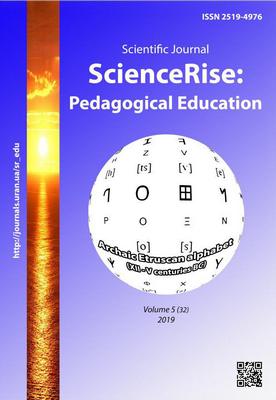Експериментальна перевірка ефективності методики навчання майбутніх філологів фонетики китайської мови
DOI:
https://doi.org/10.15587/2519-4984.2019.178026Ключові слова:
експеримент, студенти, планування, хід експерименту, експериментальна група, фонетика китайської мовиАнотація
Процеси глобалізації та світової співдружності, а також роль і місце України та Китайської Народної Республіки на геополітичній карті світу диктують потребу у створенні міцних наукових, політичних, економічних, культурних, енергетичних контактів, які призведуть до поступу обох країн, до створення та розвитку нових технологій, нових економічних та гуманітарних відносин. Це потребує підготовки значної кількості кваліфікованих фахівців та знавців китайської мови.
Фонетика китайської мови є вкрай важливою для навчання мови в цілому, адже китайська мова має особливу типологічну характеристику – наявність тону, який виконує дистинктивно-перцептивну та дистинктивно-сигніфікативну функції. Оволодіти китайською мовою та зокрема лексичними одиницями (як ключовими в спілкуванні) можна лише за умови здатності розрізнювати та правильно відтворювати тони. Проте вивчення фонетики не обмежується артикуляційними навичками, а передбачає засвоєння студентами ритміко-інтонаційних моделей, які так само мають семантичні відтінки і є важливими в плані реалізації прагматики мовлення.
У дослідженні описана експериментальна перевірка ефективності методики навчання майбутніх філологів фонетики китайської мови, а також обґрунтовано та підтверджено вибір гіпотези дослідження. Зазначено критерії та норми оцінювання китаємовної фонетичної компетентності майбутніх філологів-синологів. Визначено методи та матеріали, план та структура, а також тривалість експерименту. Крім того були наведені приклади завдань та кінцева мета їх виконання.
Висвітлено організаційні і змістові аспекти експериментального навчання студентів. Проведені післяекспериментальні зрізи, викладені відповідні результати ефективності створеної методики навчання фонетики китайської мови. Для більш чіткого сприйняття результати зрізів були винесені в таблиці
Посилання
- Gurvich, P. B. (1980). Theory and practice of experiment in the methodology of teaching foreign languages (special course). Vladimir, 104.
- Lyakhovitsky, M. V. (2012). On the essence and specifics of an experimental study in the methodology of teaching a foreign language. Foreign languages in school. Golden pages, 8, 3–10.
- Prisnaia, L. L. (2008). Professionalno orientirovannoe obuchenie fonetike kitaiskikh studentov-rusistov: vkliuchennaia forma obucheniia. Moscow, 22.
- Selivanova, O. O. (2006). Modern linguistics: a terminological encyclopedia. Poltava: Environment-K, 716.
- Barakhta, A. V. (2015). The phenomenon of interference in the conditions of studying a second foreign language. Pelagological technology. Moscow: Vestnik TSPU, 83.
- James Huang, C.-T., Audrey Li, Y.-H., Simpson, A. (2014). The Handbook of Chinese Linguistics. Hoboken: Wiley-Blackwell, 680. doi: http://doi.org/10.1002/9781118584552
- Harisov, F. F., Harisova, Ch. M. (2013). The bases of sustainable knowledge and students skills (minimization of pronouncing material). KazGUKI Newspaper, 3. Available at: https://cyberleninka.ru/article/n/minimizatsiya-proiznositelnogo-materiala-osnova-formirovaniya-ustoychivyh-znaniy-i-navykov-uchaschihsya-1 Last accessed: 05.05.2019
- Dejin, S. (2014). Teaching Pronunciation and Phonetics to International Students. Beijing: Commercial Press, 450.
- Tsapaeva, Y. A. (2007). Criteria for the selection of vocabulary for students of technical faculties at advanced stage of teaching English. Scientific and technical journal of information technologies, mechanics and optics, 36. Available at: http://cyberleninka.ru/article/n/kriterii-otbora-leksiko-grammaticheskogo-materiala-dlya-studentov-tehnicheskih-fakultetov-na-prodvinutom-etape-obucheniya-angliyskomu Last accessed: 20.02.2018
- Chukhno, O. (2017). Experimental testing of the effectiveness of teaching methods of future English pronunciation teachers after German. Teaching languages in higher education today. Cross-curricular links, 31, 93–105.
- Persaud, C. (2018). Bloom’s Taxonomy: The Ultimate Guide. Available at: https://tophat.com/blog/blooms-taxonomy-ultimate-guide/ Last accessed: 20.09.2019
- Gurvich, P. B. (1980). Theory and Practice of Experimentation in the Methods of Teaching Foreign Languages: Special Course. Vladimir: Vladimir State Pedagogical Institute. P. I. Lebedev-Podolsky, 104.
- Serova, T. S. (2009). Training in flexible, foreign language professionally oriented reading in the conditions of business intercultural communication: a monograph. Perm: Publisher of the Perm State. tech. Univ, 242.
##submission.downloads##
Опубліковано
Як цитувати
Номер
Розділ
Ліцензія
Авторське право (c) 2019 Тетяна Перелома

Ця робота ліцензується відповідно до Creative Commons Attribution 4.0 International License.
Наше видання використовує положення про авторські права Creative Commons CC BY для журналів відкритого доступу.
Автори, які публікуються у цьому журналі, погоджуються з наступними умовами:
1. Автори залишають за собою право на авторство своєї роботи та передають журналу право першої публікації цієї роботи на умовах ліцензії Creative Commons CC BY, котра дозволяє іншим особам вільно розповсюджувати опубліковану роботу з обов'язковим посиланням на авторів оригінальної роботи та першу публікацію роботи у цьому журналі.
2. Автори мають право укладати самостійні додаткові угоди щодо неексклюзивного розповсюдження роботи у тому вигляді, в якому вона була опублікована цим журналом (наприклад, розміщувати роботу в електронному сховищі установи або публікувати у складі монографії), за умови збереження посилання на першу публікацію роботи у цьому журналі.









